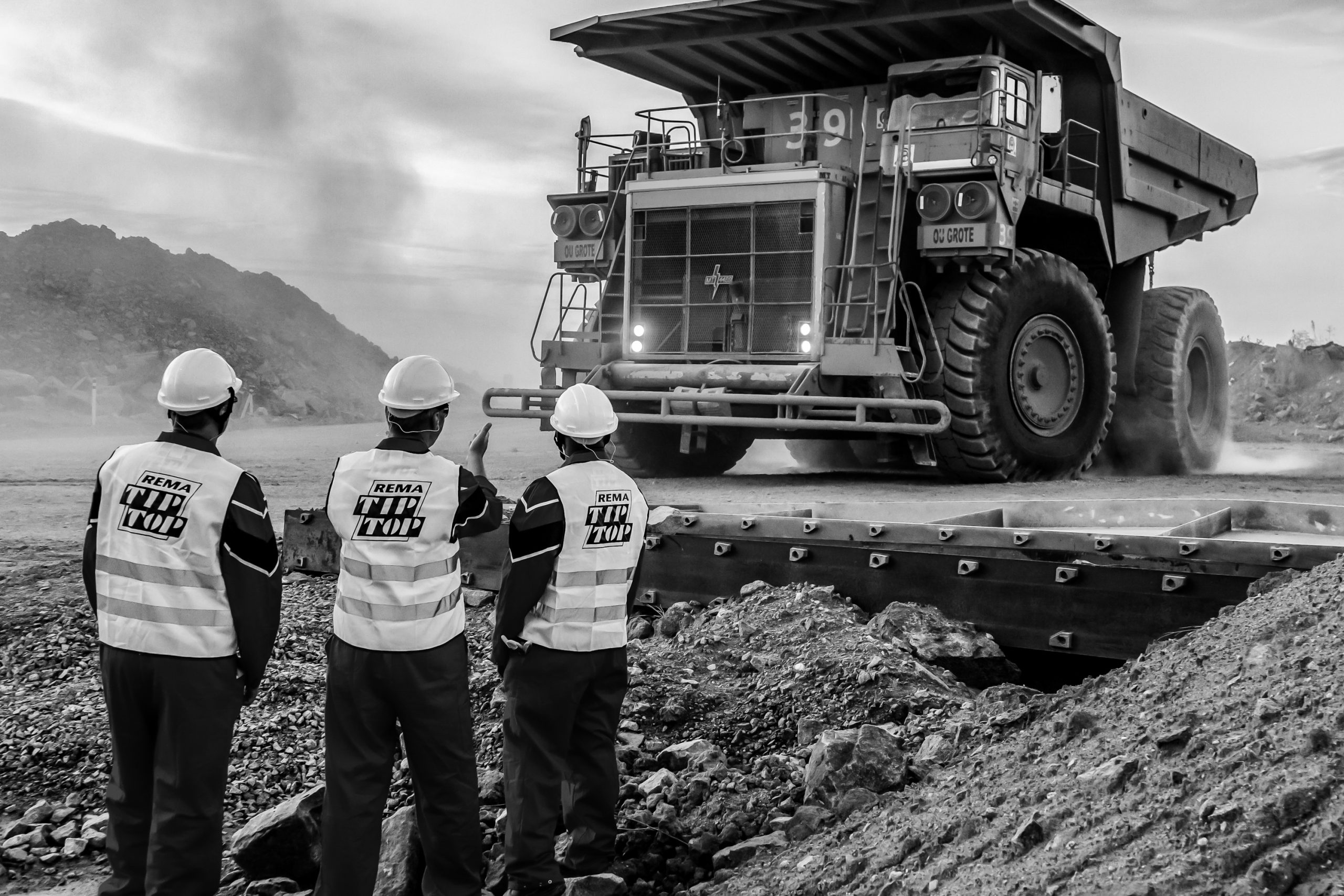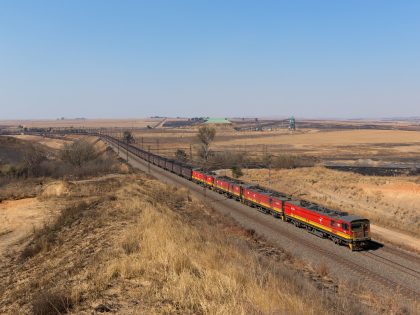Whose transition is it anyway?
Africa’s first G20 presidency could mark a turning point for the continent—or simply another performance of green-washed extraction led by mining elites.

Platinum mine, Johannesburg, 2024. Image © Wirestock Creators vis Shutterstock.
When the G20 meets in Johannesburg this November, President Cyril Ramaphosa will step into the spotlight as host. It is a historic first for Africa. With an agenda heavy on critical minerals, energy transition, and financing, this is a chance that could, in theory, reshape the terms of the global economy to better serve Africa’s interests. Yet Ramaphosa’s G20 presidency risks becoming another performance of elite-driven extractivism dressed up as a “just transition.”
The so-called green transition is not unfolding in isolation from older forms of extraction; it is their continuation under a different name. Across the continent, the minerals fueling the world’s clean energy revolution are being sourced through the same exploitative models that have long dispossessed African communities. It is a transition that is green for some, but deadly for others.
This G20 presidency arrives in a city whose own streets tell the story of extractive capitalism and lay bare its consequences. The glittering origins of Johannesburg—Egoli, the “City of Gold”—have now given way to cracked roads, failing water systems, and widening inequality. The same city that once powered colonial industry now struggles to keep its lights on. It is a fitting stage for a summit where leaders will unveil their ambitions for lithium, cobalt, and graphite to power “green growth,” against the backdrop of a city built off gold but now literally collapsing under the weight of its own history of extraction, colonialism, and racial capitalism. Johannesburg’s story is not an exception, but a warning of what has happened—and will continue to happen—in mining regions across Africa.
The green energy race is fueling a 21st-century scramble for Africa’s critical minerals, this time justified by the climate imperatives rather than colonial civilizing missions. While China expands its reach through the Belt and Road Initiative, the United States and European Union are trying to curb China’s influence by securing mineral supply chains through investments in projects like the Lobito Corridor. Amid this competition, countries like South Africa, Zimbabwe, Tanzania, and DRC are cast as “strategic partners” yet treated merely as sites of resources to be extracted.
Ramaphosa’s South Africa, straddling BRICS and the G20, markets its “strategic non-alignment” as a form of sovereignty. But in practice, it risks becoming the broker between competing imperial centers—facilitating access for all sides while communities at home bear the costs.
Ramaphosa has long presented himself as a champion of investment and growth, but those gains have flowed upward and exacerbated inequality. Before entering politics, he made his fortune through Black Economic Empowerment deals in the mining sector, becoming one of South Africa’s richest men. His family continues to benefit from the industry. His brother-in-law, Patrice Motsepe, is a mining magnate with sprawling interests in platinum, manganese, and increasingly, green energy ventures. Ramaphosa himself has sat on the boards of the very corporations now lining up to expand into Africa’s lithium, cobalt, and graphite sectors. From Marikana, where striking miners were massacred while he sat on the board of Lonmin, to today’s “just transition”—through privatization of state entities—his record reflects a leader aligned more with capital than with workers or communities.
This overlap between political leadership and corporate mining interests is not incidental. It is the architecture of South Africa’s export-oriented, elite-driven economy. Now, as G20 president, Ramaphosa arrives at a moment when critical minerals have become the crown jewel of the summit agenda. Yet beneath the language of transition lies a familiar logic that casts Africa as the quarry for the world’s future industries, and that turns mining regions into sacrifice zones where communities face land dispossession, disrupted livelihoods, environmental degradation, and cultural loss.
In Zimbabwe’s Buhera District, families face displacement for lithium projects destined for European electric vehicles. Farms, homes, and even graves have been dug up in the pursuit of lithium. But graves, homes, and livelihoods do not figure into the G20’s metrics of success; what matters is securing a “stable supply” of lithium for global markets. In Ulanga, Tanzania, graphite mining threatens food security as fertile farmland is swallowed by pits. For G20 leaders, graphite is a “strategic mineral”; for farmers, it is a threat to survival. And in the DRC’s Ruashi, cobalt extraction leaves water poisoned and children ill, even as cobalt is celebrated in G20 communiqués as vital for “clean” batteries and “green” energy. Inequalities are stark: While mining companies reap enormous profits and consume vast amounts of energy, local communities remain impoverished and without access to electricity.
These are not isolated tragedies. They are the ground-level expression of the very policies now being formalized in G20 working groups and mechanisms, that frame Africa’s mineral wealth as a global resource to be secured, stabilized, and monetized. Through financing arms like the World Bank’s International Finance Corporation (IFC), the African Development Bank (AfDB), and the new G20 Task Force on critical minerals, the summit’s agenda is shaping the next phase of extractive expansion.
President Ramaphosa stated, “As minerals extraction accelerates to match the needs of the energy transition, the countries and local communities endowed with these resources must be the ones to benefit the most.” But the people whose lands, water, and bodies are most directly affected are excluded from the conversation. Communities facing displacement in Buhera, farmers in Ulanga, and families in Ruashi are never invited to the policy tables where their futures are negotiated. Instead, those spaces are dominated by governments, corporations, and financiers whose priority is securing minerals for global markets. The language of “investment” and “partnerships” sounds progressive, but it masks the absence of free, prior, and informed consent, the silencing of local visions for development, and the criminalization of dissent.
Ramaphosa could, in theory, use South Africa’s G20 presidency to break this cycle. He could push for policies that insist on value addition within Africa, not just raw exports; for technology transfers to build African processing industries; for financing models that prioritize community consent and ecological protection, not elite enrichment. He could demand that “just transition” means more than a slogan; that it includes reparations for destruction, fair taxation of transnational corporations, and space for communities themselves to decide the terms of development.
But this seems unlikely. That would require a break with the very logic that underpins his political project. Ramaphosa’s alignment with mining capital is not merely personal or financial; it is ideological. He subscribes to the belief that Africa’s route to development runs through extraction, that resource-led growth is the continent’s comparative advantage. This worldview is shared by many African leaders who, in the absence of industrial alternatives and under pressure from creditors, see mineral exports as the fastest route to revenue and legitimacy. It feels as if the die is already cast for Africa’s first G20 presidency to become another performance where leaders proclaim sovereignty while signing deals that deepen dependency, and Ramaphosa styling himself as a champion of the continent while mining elites carve up the spoils.
The G20 summit is an opportunity, yes, but only if Africa refuses to be cast once more as the quarry for the world’s green ambitions. Unless Ramaphosa, a man so deeply tied to mining capital, is willing to break with the logic of extractivism, his presidency will not mark the desperately needed new chapter of genuinely championing the rights of communities resisting displacement and ecological devastation. If Ramaphosa doesn’t move the G20 beyond rhetoric, the summit will only reinforce the very economic model that made him and his family billionaires. South Africans, and Africans more broadly, must insist that this just transition belongs to us and demand that the G20, led by Ramaphosa, recognize us. Communities across the continent are showing us the way. From Buhera to Ulanga to Ruashi, they are articulating different visions of justice within energy transitions, rooted in land rights, democratic participation, self-determination and ecological care. Their struggles remind us that a truly just transition cannot be brokered by the elites in closed boardrooms or G20 task forces. It must begin with those whose futures are most directly at stake. If not, the G20 will not mark a turning point for Africa and Africans. It will mark a repetition—a ceremony of elite enrichment dressed in the language of justice.
And so, the G20, like Johannesburg, the city of gold turned city of decay, must move beyond extraction and global capitalism, towards a future where what glitters gives life, not takes it.



